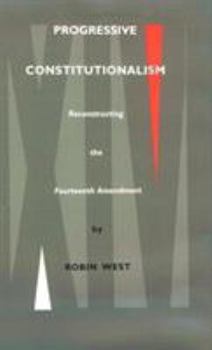Progressive Constitutionalism: Reconstructing the Fourteenth Amemdment
(Part of the Constitutional Conflicts Series)
The Fourteenth Amendment guarantees all citizens equal protection under the law as well as immunity from laws that deprive them of life, liberty, or property without due process of law. In Progressive Constitutionalism , Robin West develops an interpretation of this amendment that contrasts with the views, conservative and liberal, of the Rehnquist, Burger, and Warren Courts, and with the radical "antisubordinationist" account provided by the critical legal studies movement and many prominent feminist and critical race theorists. Her interpretation consists of a "substantive" argument regarding the Amendment's core meaning, and a jurisprudential argument regarding the role of the courts and Congress in fulfilling the Amendment's progressive promise. West shows how the "equal protection" clause, far from insulating the private spheres of culture, market, and home life, as is commonly held, directly targets abuses of power within those spheres. She develops a number of arguments for the modern relevance of this understanding, from the failure of the state to provide equal protection against private domestic violence, permitting a "private sovereignty" of patriarchal power within the home, to the the state's failure to provide equal protection against material deprivation, allowing "private sovereignty" between economically privileged and desperate people in private markets. West's argument extends to the "liberty" prong of the due process clause, seen here as a protection of the positive, not negative, liberty of citizens, covering rights in such typically controversial areas as welfare, education, and domestic safety. This interpretation recasts a number of contemporary constitutional issues, such as affirmative action and hate speech, and points to very different problems--notably private, unchecked criminal violence and extreme economic deprivation--as the central constitutional dilemmas of our day. Progressive Constitutionalism urges a substantive, institutional, and jurisprudential reorientation of our understanding of the Fourteenth Amendment, one that would necessarily be pursued through Congressional rather than judicial channels. In doing so, with attention to history and both feminist and critical race scholarship, it should reinvigorate our politics and our constitutional conversations--and, perhaps, point us toward a more just society.
Format:Hardcover
Language:English
ISBN:0822315254
ISBN13:9780822315254
Release Date:December 1994
Publisher:Duke University Press
Length:368 Pages
Weight:1.85 lbs.
Dimensions:1.4" x 6.5" x 9.6"
Customer Reviews
0 rating





